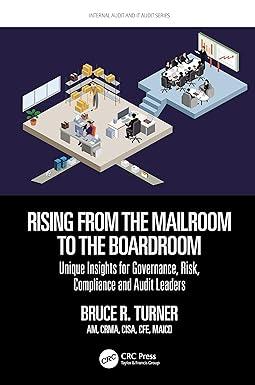Question
On April 1, 2014, Rasheed Company assigns $507,600 of its accounts receivable to the Third National Bank as collateral for a $344,000 loan due July
On April 1, 2014, Rasheed Company assigns $507,600 of its accounts receivable to the Third National Bank as collateral for a $344,000 loan due July 1, 2014. The assignment agreement calls for Rasheed Company to continue to collect the receivables. Third National Bank assesses a finance charge of 3% of the accounts receivable, and interest on the loan is 10% (a realistic rate of interest for a note of this type).
Prepare the April 1, 2014, journal entry for Rasheed Company. (If no entry is required, select "No Entry" for the account titles and enter 0 for the amounts. Credit account titles are automatically indented when the amount is entered. Do not indent manually.)
Date Account Titles and explantions
April 1, 2014
| Account? | Debit | Credit |
| Account? | Debit | Credit |
| Account? | Debit | Credit |
Prepare the journal entry for Rasheeds collection of $371,000 of the accounts receivable during the period from April 1, 2014, through June 30, 2014. (If no entry is required, select "No Entry" for the account titles and enter 0 for the amounts. Credit account titles are automatically indented when the amount is entered. Do not indent manually.)
Account Titles and Explanations
| Account? | Debit | Credit |
| Account? | Debit | Credit |
On July 1, 2014, Rasheed paid Third National all that was due from the loan it secured on April 1, 2014. Prepare the journal entry to record this payment. (If no entry is required, select "No Entry" for the account titles and enter 0 for the amounts. Credit account titles are automatically indented when the amount is entered. Do not indent manually.)
Date Account Titles and Explantions
July 1, 2014
| Account? | Debit | Credit |
| Account? | Debit | Credit |
| Account? | Debit | Credit |
List of possible accounts for each entry:
Accounts Payable Accounts Receivable Advertising Expense Allowance for Doubtful Accounts Bad Debt Expense Cash Cash Over and Short Due from Factor Due to Customer Discount on Notes Payable Discount on Notes Receivable Freight-In Freight-Out Gain on Disposal of Land Interest Expense Interest Payable Interest Receivable Interest Revenue Inventory Land Loss on Sale of Receivables Miscellaneous Expenses No Entry Notes Payable Notes Receivable Office Expense Owner's Drawings Petty Cash Postage Expense Purchase Discounts Recourse Liability Sales Discounts Sales Discounts Forfeited Sales Revenue Service Revenue Supplies Supplies Expenses Unearned Sales Revenue
Step by Step Solution
There are 3 Steps involved in it
Step: 1

Get Instant Access to Expert-Tailored Solutions
See step-by-step solutions with expert insights and AI powered tools for academic success
Step: 2

Step: 3

Ace Your Homework with AI
Get the answers you need in no time with our AI-driven, step-by-step assistance
Get Started


